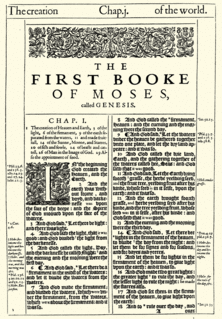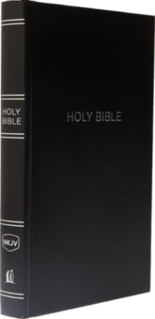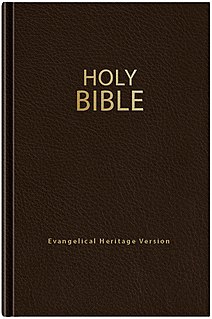See also
- Faith Comes By Hearing
- The Bible Experience
- Bible.is
- Daily Audio Bible
Audio Bibles or spoken Bibles are Bibles that were recorded in audio format. They provide the listener the ability to listen to the Scriptures without being required to look directly at written text.
The first audio Bible (KJV in English language) was recorded and narrated by Alexander Scourby in the 1950s for the American Foundation of the Blind. [1] It was first recorded on long play records, then 8-track player, cassette tape. The Bible in cassette tape was 72-hours long, and it took 72 cassette tapes to record the entire audio Bible. [1]
From then on other audio Bibles were recorded on CDs, DVDs and other media devices.
David Suchet recorded and narrated the entire Bible (NIV) and James Earl Jones recorded and narrated the New Testament (KJV). Likewise, Johnny Cash recorded and narrated the King James New Testament. Laurence Olivier also recited portions of the King James Bible.[ citation needed ]

The standard works of The Church of Jesus Christ of Latter-day Saints are the four books that currently constitute its open scriptural canon. The four books of the standard works are:

The King James Version (KJV), also the King James Bible (KJB) and the Authorized Version, is an English translation of the Christian Bible for the Church of England, which was commissioned in 1604 and published in 1611, by sponsorship of King James VI and I. The 80 books of the King James Version include 39 books of the Old Testament, an intertestamental section containing 14 books of what Protestants consider the Apocrypha, and the 27 books of the New Testament. Noted for its "majesty of style", the King James Version has been described as one of the most important books in English culture and a driving force in the shaping of the English-speaking world.

The Revised Version (RV) or English Revised Version (ERV) of the Bible is a late 19th-century British revision of the King James Version. It was the first and remains the only officially authorised and recognised revision of the King James Version in Great Britain. The work was entrusted to over 50 scholars from various denominations in Great Britain. American scholars were invited to co-operate, by correspondence. Its New Testament was published in 1881, its Old Testament in 1885, and its Apocrypha in 1894. The best known of the translation committee members were Brooke Foss Westcott and Fenton John Anthony Hort; their fiercest critics of that period were John William Burgon and George Saintsbury.

The King James Only movement asserts that the King James Version (KJV) of the Bible is superior to all other translations of the Bible. Adherents of the King James Only movement, largely members of Conservative Anabaptist, Conservative Holiness Methodist, traditional High Church Anglican, and Baptist churches, believe that the KJV needs no further improvements because it is the greatest English translation of the Bible which was ever produced, and they also believe that all other English translations of the Bible which were produced after the KJV was produced are corrupt.
Partial Bible translations into languages of the people can be traced back to the late 7th century, including translations into Old and Middle English. More than 100 complete translations into English have been written.

The American Standard Version (ASV), officially Revised Version, Standard American Edition, is a Bible translation into English that was completed in 1901 with the publication of the revision of the Old Testament. The revised New Testament had been released in 1900. It was previously known by its full name, but soon came to have other names, such as the American Revised Version, the American Standard Revision, the American Standard Revised Bible, and the American Standard Edition.

The New King James Version (NKJV) is an English translation of the Bible. The complete NKJV Bible was published in 1982 by Thomas Nelson, now HarperCollins. The NKJV is described by Thomas Nelson as being "scrupulously faithful to the original, yet truly updated to enhance its clarity and readability."

Modern English Bible translations consists of translations developed and published throughout the late modern period to present-day. A multitude of recent attempts have been made to translate the Bible into English. Most modern translations published since c. 1900 are based on scholarly critical editions of the original Hebrew and Greek texts. Recent translations typically rely on the Biblia Hebraica Stuttgartensia / Biblia Hebraica Quinta, counterparted by the Novum Testamentum Graece.
An audiobook is a recording of a book or other work being read out loud. A reading of the complete text is described as "unabridged", while readings of shorter versions are abridgements.

Matthew 24 is the twenty-fourth chapter of the Gospel of Matthew in the New Testament of the Christian Bible. It commences the Olivet Discourse or "Little Apocalypse" spoken by Jesus Christ, also described as the Eschatological Discourse, which continues into chapter 25, and contains Jesus' prediction of the destruction of the Temple in Jerusalem. Mark 13 and Luke 21 also cover the same material.

Peter Sturges Ruckman was an American Independent Fundamental Baptist pastor, author, and founder of the Pensacola Bible Institute in Pensacola, Florida.

The biblical apocrypha denotes the collection of apocryphal ancient books thought to have been written some time between 200 BC and AD 400. Some Christian churches include some or all of the same texts within the body of their version of the Old Testament, terming them deuterocanonical books. Traditional 80-book Protestant Bibles include fourteen books in an intertestamental section between the Old Testament and New Testament called the Apocrypha, deeming these useful for instruction, but non-canonical.

The Trinitarian Bible Society was founded in 1831 "to promote the Glory of God and the salvation of men by circulating, both at home and abroad, in dependence on the Divine blessing, the Holy Scriptures, which are given by inspiration of God and are able to make men wise unto salvation through faith which is in Christ Jesus."

A Protestant Bible is a Christian Bible whose translation or revision was produced by Protestants. Such Bibles comprise 39 books of the Old Testament and 27 books of the New Testament for a total of 66 books. Some Protestants use Bibles which also include 14 additional books in a section known as the Apocrypha bringing the total to 80 books. This is often contrasted with the 73 books of the Catholic Bible, which includes seven deuterocanonical books as a part of the Old Testament. The division between protocanonical and deuterocanonical books is not accepted by all Protestants who simply view books as being canonical or not and therefore classify books found in the deuterocanon, along with other books, as part of the Apocrypha.
Recorded Books is an audiobook imprint of RBMedia, a publishing company with operations in countries globally. Recorded Books was formerly an independent audiobook company before being purchased and re-organized under RBMedia, where it is now an imprint. Recorded Books was founded in 1978 by Henry Trentman, one of the pioneers in the audiobook industry.

The Modern English Version (MEV) is an English translation of the Bible begun in 2005 and completed in 2014. The work was edited by James F. Linzey, and is an update of the King James Version (KJV), re-translated from the Masoretic Text and the Textus Receptus. The ecumenical Committee on Bible Translation is composed of 47 American and English scholars from the three major branches of Christianity: Orthodox, Protestant, and Roman Catholic.

James 5 is the fifth chapter of the Epistle of James in the New Testament of the Christian Bible. The author identifies himself as "James, a servant of God and of the Lord Jesus Christ" and the epistle is traditionally attributed to James the brother of Jesus, written in Jerusalem between 48 and 61 CE. Alternatively, some scholars argue that it is a pseudographical work written after 61 CE. This chapter contains a warning to the rich and an exhortation to be patient until the coming of the Lord.

Revelation 6 is the sixth chapter of the Book of Revelation or the Apocalypse of John in the New Testament of the Christian Bible. The book is traditionally attributed to John the Apostle, but the precise identity of the author remains a point of academic debate. This chapter describes the opening of the first six of the seven seals. The opening of the seventh seal is recorded in chapter 8. Four horses and their riders, the Four Horsemen of the Apocalypse, emerge as the first four seals are opened.

The Evangelical Heritage Version (EHV) is a translation of the Bible into the English language. The translation project was called The Wartburg Project and the group of translators consisted of pastors, professors, and teachers from the Wisconsin Evangelical Lutheran Synod (WELS) and Evangelical Lutheran Synod (ELS), both based in the United States.